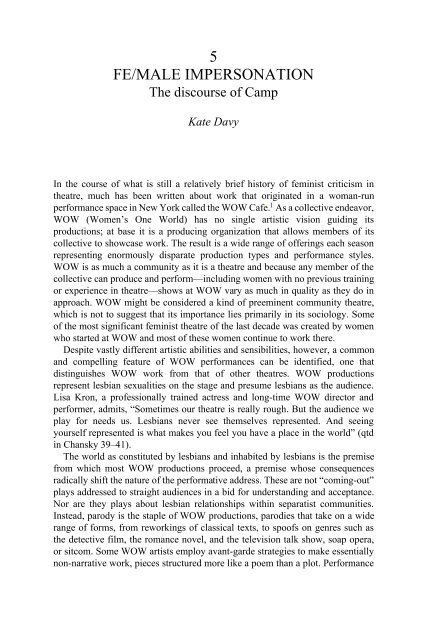Edited by Moe Meyer - Get a Free Blog
Edited by Moe Meyer - Get a Free Blog
Edited by Moe Meyer - Get a Free Blog
Create successful ePaper yourself
Turn your PDF publications into a flip-book with our unique Google optimized e-Paper software.
5<br />
FE/MALE IMPERSONATION<br />
The discourse of Camp<br />
Kate Davy<br />
In the course of what is still a relatively brief history of feminist criticism in<br />
theatre, much has been written about work that originated in a woman-run<br />
performance space in New York called the WOW Cafe. 1 As a collective endeavor,<br />
WOW (Women’s One World) has no single artistic vision guiding its<br />
productions; at base it is a producing organization that allows members of its<br />
collective to showcase work. The result is a wide range of offerings each season<br />
representing enormously disparate production types and performance styles.<br />
WOW is as much a community as it is a theatre and because any member of the<br />
collective can produce and perform—including women with no previous training<br />
or experience in theatre—shows at WOW vary as much in quality as they do in<br />
approach. WOW might be considered a kind of preeminent community theatre,<br />
which is not to suggest that its importance lies primarily in its sociology. Some<br />
of the most significant feminist theatre of the last decade was created <strong>by</strong> women<br />
who started at WOW and most of these women continue to work there.<br />
Despite vastly different artistic abilities and sensibilities, however, a common<br />
and compelling feature of WOW performances can be identified, one that<br />
distinguishes WOW work from that of other theatres. WOW productions<br />
represent lesbian sexualities on the stage and presume lesbians as the audience.<br />
Lisa Kron, a professionally trained actress and long-time WOW director and<br />
performer, admits, “Sometimes our theatre is really rough. But the audience we<br />
play for needs us. Lesbians never see themselves represented. And seeing<br />
yourself represented is what makes you feel you have a place in the world” (qtd<br />
in Chansky 39–41).<br />
The world as constituted <strong>by</strong> lesbians and inhabited <strong>by</strong> lesbians is the premise<br />
from which most WOW productions proceed, a premise whose consequences<br />
radically shift the nature of the performative address. These are not “coming-out”<br />
plays addressed to straight audiences in a bid for understanding and acceptance.<br />
Nor are they plays about lesbian relationships within separatist communities.<br />
Instead, parody is the staple of WOW productions, parodies that take on a wide<br />
range of forms, from reworkings of classical texts, to spoofs on genres such as<br />
the detective film, the romance novel, and the television talk show, soap opera,<br />
or sitcom. Some WOW artists employ avant-garde strategies to make essentially<br />
non-narrative work, pieces structured more like a poem than a plot. Performance


